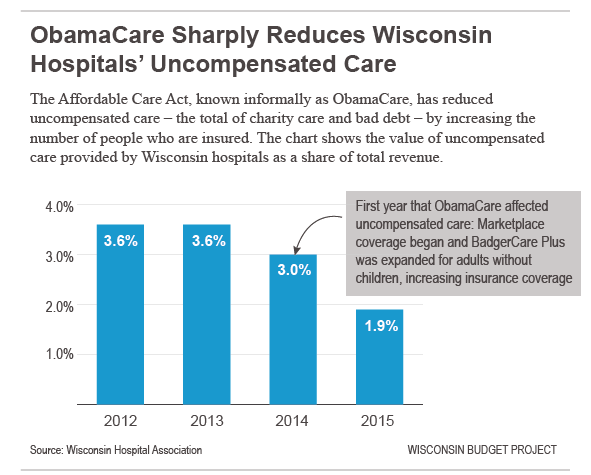Obamacare Slashes Uncompensated Care by 47%
Wisconsin Hospital Association’s data shows far less unpaid health care costs shifted to other systems, payers.
New data from the Wisconsin Hospital Association show that the federal health care reform law has had the desired effect of causing a sharp drop in uncompensated care. That’s great news because much of the cost of uncompensated care for people who are uninsured gets shifted to other patients and contributes to higher rates for people with insurance.
The reduced spending for uncompensated care – which is the total of charity care and bad debt – also has the benefit of creating a great opportunity for hospitals to make upstream investments that promote public health and alleviate some of the factors causing severe health disparities.
The new data demonstrate that uncompensated care expenses borne by Wisconsin hospitals have dropped precipitously since 2013, as key parts of the Affordable Care Act (ACA) were being implemented – including the new insurance Marketplace and the expansion of coverage for childless adults. After those provisions had been in place for two years, total uncompensated care fell in Wisconsin by $534 million in fiscal year 2015, a drop of 36.8 percent from the 2013 level.
The sharp decline in uncompensated care is even more precipitous when measured relative to total patient revenue. As the bar graph illustrates, uncompensated care fell from 3.6 percent of patient revenue in fiscal years 2012 and 2013 to 1.9 percent last year, which is a drop of about 47 percent.
Another way to measure uncompensated care, which many advocates prefer, is to use actual costs rather than hospital charges. Using that method, the dollar amounts are much smaller, but the percentage change is comparable. Based on costs, total uncompensated fell by almost $217 million over the last two years, a decline of 38.1 percent.
The rapid drop in hospitals’ uncompensated care costs is almost the same as the drop in uninsured Wisconsinites, which fell by 37.6 percent from 2013 to 2015. That correlation is one of the reasons why state policymakers should not be satisfied that there are still about 323,000 uninsured people in our state.
Although I think the drop in uncompensated care is great news, it also needs to be noted that nonprofit hospitals, which don’t pay income or property taxes, have both a legal and moral obligation to help people in need in their communities. In light of the 40 percent drop in the charity care portion of uncompensated care over the past two years, hospitals have a wonderful opportunity – as well as an obligation – to find other ways to help meet community needs.
The savings accruing to hospitals from the ACA should enable them to help achieve another objective of health care reform – an increased emphasis on addressing population health issues, including the social determinants of the glaring disparities in health outcomes for low-income families and particularly for communities of color. Some hospitals have begun to make investments that can help alleviate those disparities, but I think that’s an area where health care providers need to be investing far more resources, and it’s an area that also merits more attention from policymakers and advocates.
Wisconsin Budget
-
Charting The Racial Disparities In State’s Prisons
 Nov 28th, 2021 by Tamarine Cornelius
Nov 28th, 2021 by Tamarine Cornelius
-
State’s $1 Billion Tax Cut Leaves Out 49% of Taxpayers
 Sep 21st, 2021 by Tamarine Cornelius
Sep 21st, 2021 by Tamarine Cornelius
-
TANF Program Serves a Fraction of Poor Families
 Aug 30th, 2021 by Jon Peacock
Aug 30th, 2021 by Jon Peacock























Wonderful news about uncompensated care reductions. Demonstrates the value and effectiveness of Federal Healthcare Reform. As a community, state and nation, it is vital that we vote against Trump and Ryan, and any other politician who would dismantle “Obamacare” or promote other measures that would further erode the income and earning capacity of the poorer and middle classes.
3 thoughts:
1. This shows Walker’s plan to partially implement medicaid expansion was a win! Yay, go us.
2. instead of just uncompensated care, what about underfunded? Since medicare doesn’t cover full costs for treatment, what percentage of care is now only partially covered? Did it go up/down?
3. I disagree with the author on what hospitals should do with the reduction of uncompensated care. I believe this should be used to cut down on the annual healthcare cost increases that hurt everyone.